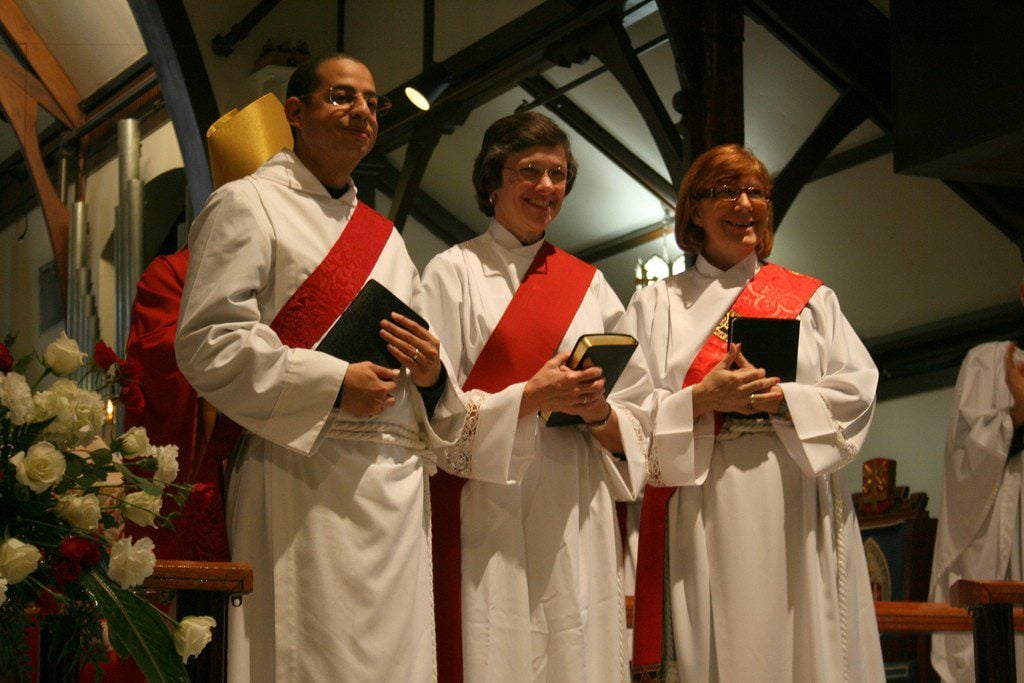
Yes, everyone was in a writing frenzy about suggestions that the Pope would permit the ordination of women as deacons.
Consider the “Deacon couple” — they take the classes together, and they both are acknowledged in the listing of staff in the church bulletin, and both are typically involved in the various church ministries, even though only he is formally ordained, and only he had a title. Would it be useful to have a way of recognizing and commissioning the female halves of such couples? Yes, of course.
But that doesn’t seem to be what’s under discussion.
Rather, what advocates of female deacons seem to want is a formal, “ordained” role for “professional” female church staff. And, really, the same issue is true for male, non-priest staff, such as a director of youth ministry, or a pastoral associate of whichever sex.
This morning, Aleteia published the full transcript of Pope’s words on this topic. One bit that’s noteworthy is that the references are to “consecrated women,” though the work that’s described that they do — the questioner says, “they teach catechesis, accompany the sick and dying, distribute Communion, and in many countries lead the common prayers in the absence of priests, and in those circumstances deliver the homily” — fits better with the work of women (and men) involved in their local parishes. And the further issue is that of “inclusion” and “need for a greater role of women in decision-making positions in the Church” – neither of which really seem to fit with the permanent diaconate, at least as it functions in the United States (perhaps elsewhere deacons are “professionals”/employees; I don’t know).
What would be of genuine value, it seems to me, is some sort of intermediate status: a sort of commissioning that’s not ordination per se, but a recognition by the community. In a way, this would be a very Protestant approach to the issue, where, it seems to me, ordination is a sort of commissioning. We’d just need a suitable title. Any thoughts?
(I wrote about this a long time ago, back when I was first dipping my toes into writing about “churchy” topics.)
Let’s back up a bit. I have 20-odd chrome tabs open right now, and need to close at least some of them before my lunch break ends. Here are some news sources/commentary on the subject.
Here’s what other Patheos writers are saying:
Fr. Dwight Longnecker’s article, “Catholic Women Deacons? Why Not?” answers the rhetorical question of his title this way:
Do we require women to be ordained so that they might have the authority to administer the church’s charitable work? The splendid work of our teaching and nursing sisters precludes the need. Women are already administering the church’s charitable work effectively at every level. Do we need deaconesses to be diocesan chancellors, school principals, parish pastoral associates, directors of faith formation, Vatican administrators, professional consultants, diplomats, journalists, and financial advisors? No. Plenty of women already fulfill these roles. Do we need women to be ordained as deaconesses to be spiritual directors, theologians, cultural activists, broadcasters, evangelists, writers and scholars? No. We have a growing number of women already doing this.
The only reason, therefore, to have deaconesses is to include women in the ranks of the clergy, but when the need is to de-clericalize the church and empower the laity, isn’t it counter productive to add yet another layer of clergy to the church? Furthermore, doesn’t it send the wrong signal to the women of the world that the only way a Catholic woman can really be important to the church is to assume a job that has traditionally been reserved to men? Doesn’t it also send a message to all laypeople that they are not bona fide disciples of Jesus Christ unless they have become a member of the clerical caste?
(One tab closed.)
Dave Armstrong addresses the concern that liberals would, if the diaconate were opened to women, use this as a wedge for their larger goal of female priests:
The so-called “progressives” would, of course, seek to exploit it, as they do everything else for their nefarious ends (as we massively see regarding Amoris Laetitia), but that’s a whole ‘nother discussion. [see fellow apologist Scott Eric Alt’s article on this very thing]
Liberals always try to exploit everything. They do that with supposedly finding permissible sodomy in the Bible, with Vatican II, with Amoris Laetitia [as well as women priests]. This will always be the case. I don’t see why that should stop us from believing or putting into practice something we deem to be proper and helpful (if indeed this is determined to be a good thing): just because they will then try to distort what happened and use it for their empty-headed goals.
Of course it is a “stalking horse,” for liberals. I’m saying that their predictable seeking to co-opt something for modernist / heterodox ends is not in and of itself a reason to rule anything out, since every good thing is distorted, inside the Church and outside it.
(Second tab closed.)
The Washington Post has an article on the subject, if you haven’t used up your free clicks. (I’m perilously close.) It fills in the context that the Pope was indeed speaking to an international conference of nuns, 900 women from the International Union of Superiors General, so it makes sense that his comments reference consecrated women. The article also cites a theologian:
“I can’t underscore enough how groundbreaking this is for the Church,” Boston College theologian James Bretzke wrote in an e-mail. “If women can be ordained as deacons, then this is going to weaken – not destroy – but weaken significantly the argument that women absolutely are incapable of being ordained as priests. So this is opening more than a crack in the door.”
(Third tab closed.)
And for the liberal Catholic view, Father James Martin’s facebook statements:
Women deacons would be able to baptize, preside at marriages and funerals, and preach during various liturgies. Their preaching would mean that the church would finally be able to hear, from the pulpit, the experience of over half its members.
What kinds of things could women deacons preach on? Everything of course, like male deacons! But imagine them preaching on the following: The Annunciation, the Visitation, the Nativity, Mary Magdalene, Mary and Martha, the Woman at the Well, the Syrophoenician woman, the appearance of the Risen Christ to Mary Magdalene, and on and on. Women deacons could preach on anything, like male deacons, but how I long to hear them preach on Jesus and on women in the New Testament. (I’d love to hear them preach on men in the Bible as well!)
(I find this odd — that a supposedly-egalitarian man would imagine women having a special gift for preaching on “women’s” topics, and the idea that your ability to preach is limited by your sex, and, by implication, the idea that men are unable to preach in a meaningful way to women.)
And, afterwards, he says
note Pope Francis’s parameters for preaching. But even with these parameters, the move is hugely significant. We are talking about reopening the discussion about ordaining women. And to reiterate, a deacon presides at baptisms, funerals and weddings, all occasions of preaching.
Now, here’s the thing about preaching: just because a person has a gift for many kinds of ministry, whether it’s paid or as a volunteer, be it working with youth, the sick or homebound, leading Bible studies or adult education groups, organizing the social or liturgical or charitable ministries of the parish — does not mean that this individual has a gift or a calling for leading liturgy, or for preaching. (And, to be honest, many people who think they have a gift for leading liturgy, who speak with earnest voices, don’t, actually.) And I’d rather not get into thinking of preaching at Mass or other liturgies as a “prize” for those who have earned it by their service in other roles.
So there you have it — and now lunch break’s over.
UPDATE: OK, a few more thoughts:
The issue isn’t confined to the Catholic Church. Here’s the big picture: it’s important to recognize people for the work they do, and the value of their contributions. This matters whether it’s providing formal thank-you’s to Scout leaders, and popcorn/cookie workers, or volunteers in professional organizations (interestingly, just today the Society of Actuaries sent around a note that they’re starting a formal recognition program for its volunteers), or at work. And the permanent diaconate has functioned as a way of formally recognizing men who dedicate a lot of time to their local parish communities, and giving them a formal role and “credential” — but there’s nothing equivalent for women. And there should be.
Image: Episcopalian deacons, from a flickr album by user Episcopal Diocese of Southwest Florida; https://www.flickr.com/photos/episcopalflorida/11309076544













